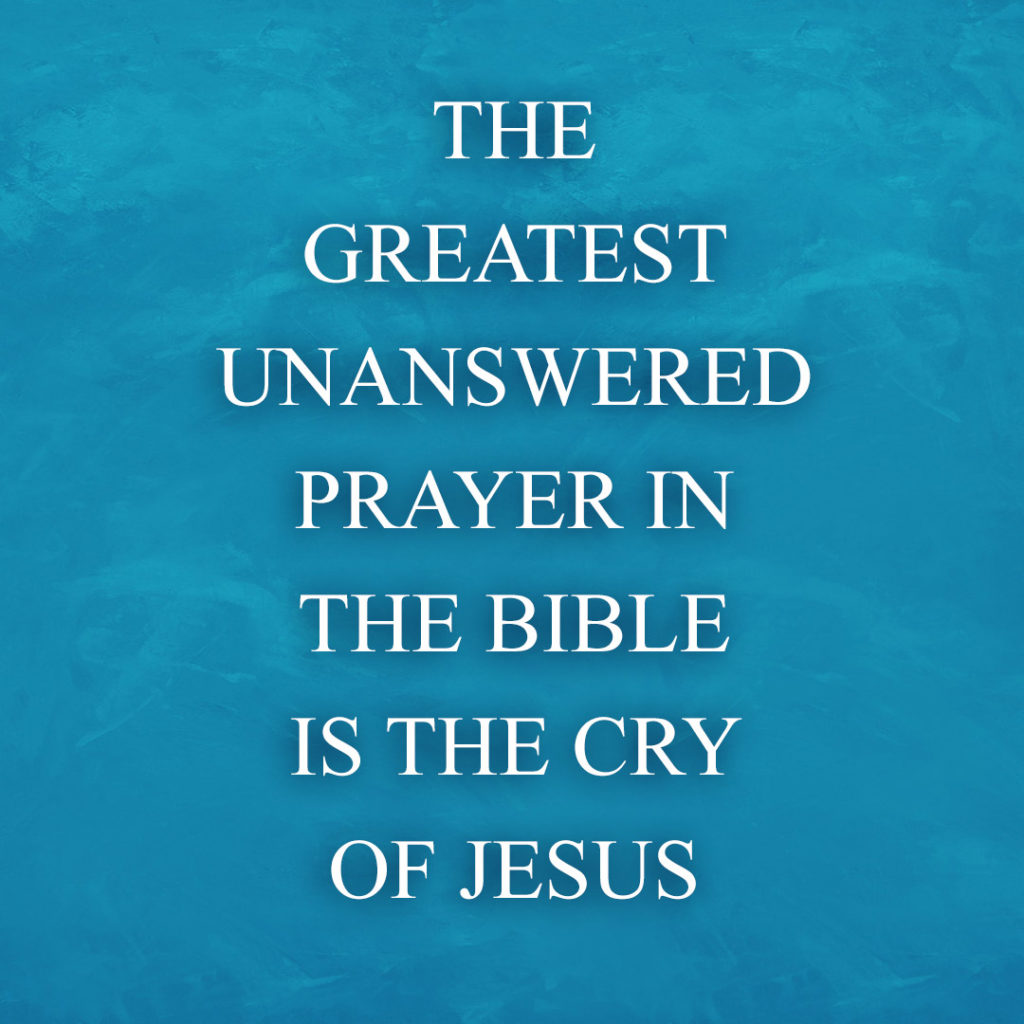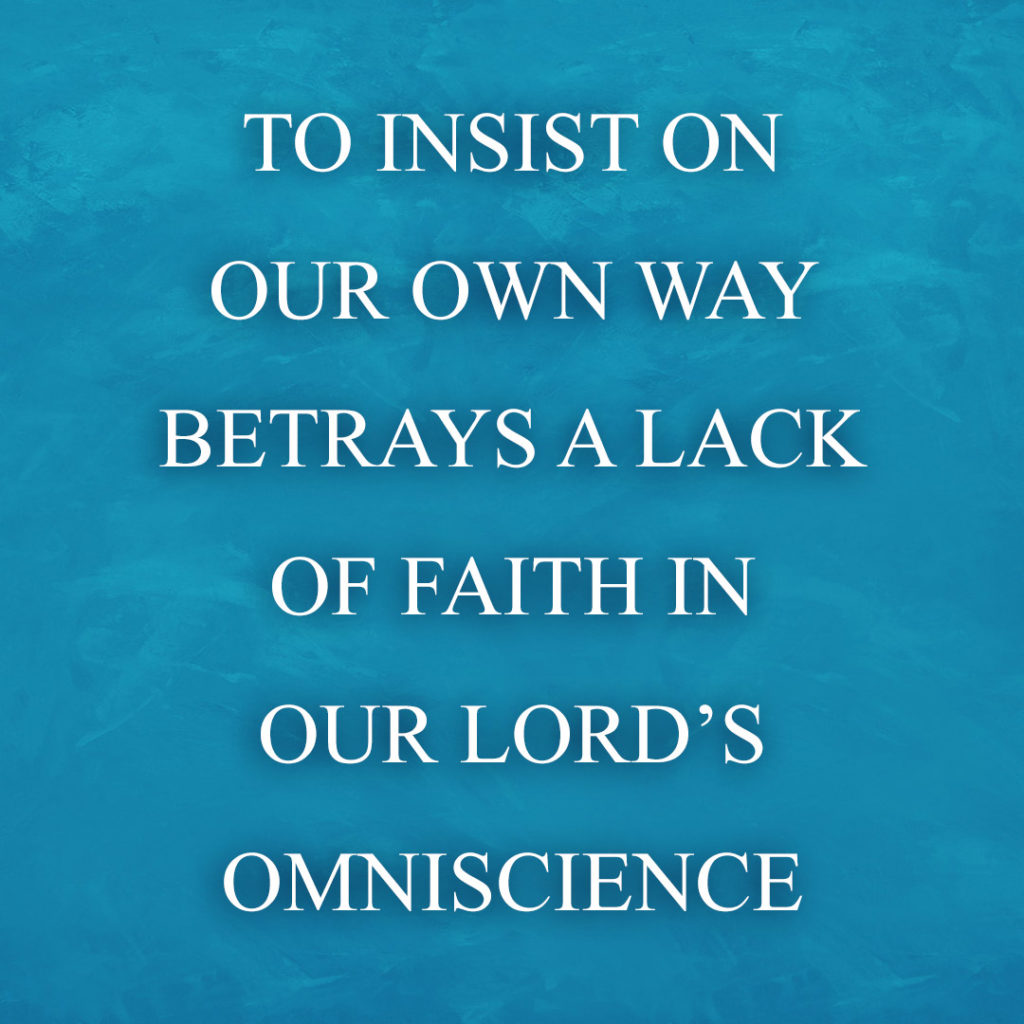Most parents understand the value of the occasional “No.” When our children were younger, Donna and I said “Yes” whenever we could, but there were times when the wisest response was “No.” The dangers of the world demand it. What if your child wants to spend the night with a family about whom you know nothing? What if they want to play in an unsafe area or near a busy street? What if the toy they want is too expensive? What if the video game is too violent? What if the movie is too explicit? Children can’t always discern the dangers behind the things they desire; so wise parents have to learn the art of the judicious “No.”
In the same way, we as Christians don't always understand the consequences of our hopes and dreams, so our wise God sometimes tells us “No” too. But His “Noes” are always in our best interest, even when it doesn’t feel that way.

When God Says "No"
Even the greatest of biblical characters faced occasional denials of their prayer requests. Abraham begged God for Ishmael to be the son of promise, but God said “No” and raised up Isaac (Genesis 17:18-19). Moses prayed earnestly to cross the Jordan with the children of Israel, but the Lord said “No” and sent Joshua (Deuteronomy 3:25-28). David prayed for his infant child to live, but the Lord took the child to heaven instead (2 Samuel 12:16-23). David wanted to build the temple, but the Lord assigned that task to Solomon (1 Chronicles 28:2-6). The demon-possessed man of the Gadarenes, having been delivered by Christ, asked to follow the Son of Man, but Jesus would not permit him, telling him: “Go home to your friends, and tell them what great things the Lord has done for you” (Mark 5:19). The apostle Paul prayed repeatedly for healing from the thorn in his flesh, but the Lord refused, saying, “My grace is sufficient for you” (2 Corinthians 12:9). And, of course, the greatest unanswered prayer in the Bible is the cry of Jesus, "O My Father, if it is possible, let this cup pass from Me" (Matthew 26:39).

Many of us are familiar with the works of the blind hymnist Fanny Crosby, such as “Blessed Assurance” and “To God Be the Glory.” Many years ago, the renowned organist Donald Hustad discovered some previously unpublished poems and hymns by Fanny Crosby, and one of them was entirely devoted to praising God for the blessings when He says “No.” The title was “For What His Love Denies,” and the first verse said:
God does not give me all I ask,
Nor answer as I pray;
But, O, my cup is brimming o'er
With blessings day by day.
How oft the joy I thought withheld
Delights my longing eyes,
And so I thank Him from my heart
For what His love denies.
Isn't "No" An Answer?
The great hymnist had discovered a powerful truth—when God says “No” we can praise and glorify Him, for by faith we believe He knows best. We should praise Him for watching out for our good, for saving us from unwise choices, and for keeping us under His gentle discipline. There are good reasons to respond positively to the delays or denials of our Heavenly Father.
To rebel against His wisdom would damage our relationship with Him. Just like a rebellious child resenting his parents when they don’t yield to his demands, even so we’re in danger of begrudging God when He doesn’t yield to ours.
To rebel against God’s denials would damage us internally. Some people become bitter with God when He doesn’t respond as they expect. But such bitterness leads to spiritually deadening, and it leaves us calloused and cold. There’s an interesting verse in the Psalms about the Israelites who insisted on having their own way: “And He gave them their request, but sent leanness into their soul” (Psalm 106:15).
To insist on our own way betrays a lack of faith in our Lord's omniscience. It’s an attitude that says: “You don’t know what You’re doing, Lord. I know best, and You are either unwise or uncaring.” But the Lord does know what He’s doing, and it’s wonderful to take His “Yeses” and “Noes” with equal joy, leaving the final choice to Him.

In the nation of India, there was a great missionary named Amy Carmichael of Dohnavur who became famous for rescuing young Indian girls who had been given over to sexual slavery. One day Amy told of a prayer she had earnestly prayed in childhood. Her mother had told her that God is very good at answering our prayers, and there was one thing little Amy wanted more than anything. She wanted blue eyes like her mother’s. Amy’s eyes were brown, but she wanted blue eyes. So one night she prayed earnestly that during the night the Lord would turn her eyes blue, and she went to sleep in simple childlike faith that God would hear and answer. The next morning she jumped out of bed, pushed a chair to the chest of drawers, climbed up, and studied her eyes in the mirror. At first she was confused and bitterly disappointed, and then a thought came to her. Even though she was simply a young child, this thought came to her: “Isn’t ‘No’ an answer?”
Later, when Amy was risking her life to rescue little girls from temple prostitution, she disguised herself by wrapping herself in Indian dress and sometimes staining her hands brown with coffee. But she couldn’t hide her eyes, and if they had been blue she would have been discovered and probably killed in an instant. They had to be brown. Amy later wrote a little poem about it:
Just a tiny little child
Three years old,
And a mother with a heart
All of gold.
Often did that mother say,
“Jesus hears us when we pray,
For He’s never far away;
And He always answers.”
Now, that tiny little child
Had brown eyes,
And she wanted blue instead—
Like blue skies.
For her mother’s eyes were blue
Like forget-me-nots. She knew
All her mother said was true,
Jesus always answered.
So she prayed for two blue eyes,
Said “Good night,”
Went to sleep in deep content
And delight.
Woke up early, climbed a chair
By a mirror. Where, O where
Could the blue eyes be? Not there!
Jesus hadn’t answered.
Hadn’t answered her at all!
Never more
Could she pray—her eyes were brown
As before.
Did a little soft wind blow?
Came a whisper soft and low,
“Jesus answered. He said, ‘No’;
Isn’t ‘No’ an answer?” 1
If we’ve earnestly asked God for something that hasn’t come to pass, let’s try praising Him anyway. If God says "No," we can take it as a "Yes" for something more valuable down the road. Let’s learn to magnify Him for what His love denies. Let’s learn to rejoice in the fact that “No” is an answer. And whenever we pray, let’s learn to pray as Jesus did: “Nevertheless not My will, but Yours, be done” (Luke 22:42).
This article originally appeared in the March 2014 issue of Turning Points devotional magazine.
Sources:
1Frank L. Houghton, Amy Carmichael of Dohnavur (Fort Washington, PA: Christian Literature Crusade, 1979), 18.
